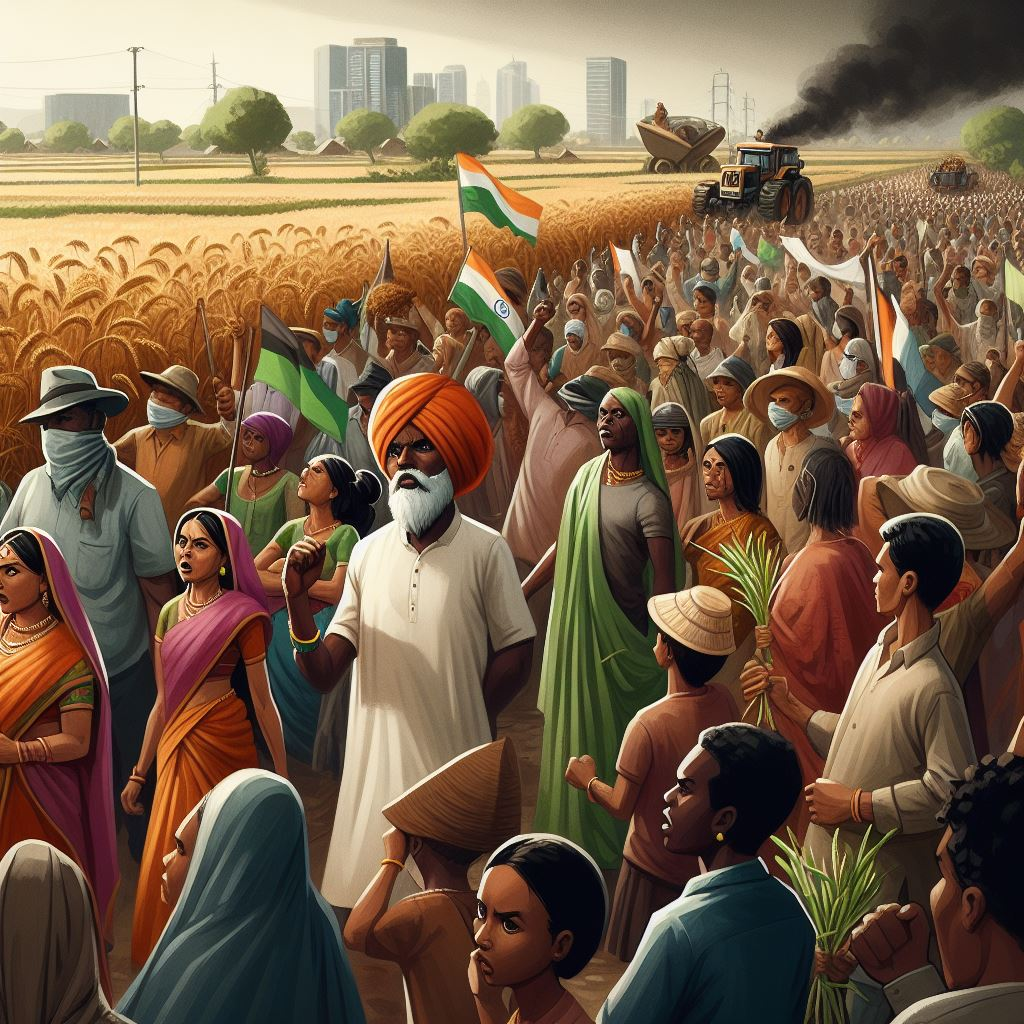
The 2024 Indian Farmers’ Protest: Cultivating Change Amidst Dust and Determination
In the heart of India, where the sun kisses the earth each morning, a different kind of harvest unfolds.
It’s not the golden wheat or the fragrant rice—it’s a harvest of voices, resilience, and unwavering hope.
It’s the 2024 Indian Farmers’ Protest.
Seeds of Dissent
Picture this: vast fields stretching to the horizon, their furrows etched with sweat and dreams. Here, the tillers of the land—the farmers—have risen once more. Their tractors, adorned with determination, rumble toward New Delhi, banners fluttering like leaves in the wind.
Their mission?
To reclaim their rights, their livelihoods, and their dignity.
In the shadow of the previous 2020–2021 Indian farmers’ protest, where promises hung like ripe fruit but remained unfulfilled, these farmers have returned.
Their demand echoes across the sun-baked plains: assured floor prices or Minimum Support Price (MSP) for their crops.
It’s not just about economics; it’s about survival.
But the journey isn’t smooth; it’s a battle against time and politics.
Tear gas clouds the air, water cannons clash with determination, and medical masks become symbols of defiance. The farmers pause, not defeated, but strategic. The government offers talks—a fragile olive branch. The fields hold their breath.
The Government is wielding tear gas canisters like reluctant poets, aiming for dispersal, not destruction. Drones hover, carrying the scent of unrest.
The farmers remain camped on the border, their resolve unyielding.
The farmers aren’t just armed with banners; they bring cranes and excavators.
“These aren’t weapons; they’re symbols of determination”.
Imagine them rolling forward, like ancient siege engines, ready to breach the barricades.
Jagjit Singh Dallewal, a farmer leader, speaks: “It is not right that such massive barricades have been placed to stop us. We want to march to Delhi peacefully. If not, they should accede to our demands.”
The government walks a tightrope. It offers talks, but the ground trembles.
The previous proposal—five-year contracts and guaranteed support prices—was rejected.
The farmers want more than ink on paper; they want their fields to yield justice.
Negotiation tables become bridges.
Gradual implementation is the rhythm of patience. But the barricades remain, and the farmers watch, their eyes like plowed fields waiting for rain.
Echoes of Unresolved Struggles
Remember the scenes from yesteryears—the barricades, the tear gas, the weary faces? The unresolved issues from the previous protest linger like a monsoon cloud refusing to burst.
The farmers’ voices, once amplified, now echo across time.
They carry the weight of generations—their ancestors who sowed the seeds, their children who await a better yield.
Current Demands: Sowing the Seeds of Change
a. Guaranteed Crop Prices
Imagine a farmer standing by his sunflower field, eyes scanning the horizon. He doesn’t just see petals; he sees stability.
The demand for guaranteed crop prices—ensuring MSP for all farm produce—is more than economic policy; it’s a lifeline.
It shields against the tempests of market volatility, preventing sharp price falls that can devastate families.
b. Income Doubling: A Promise Planted
Meet Jagtar(Name changed), a weathered farmer from Punjab.
His hands, calloused from years of toil, clutch a faded photograph of his daughter.
She dreams of becoming a doctor, and he dreams of her dreams coming true. Income doubling isn’t just about numbers; it’s about turning dreams into reality. For Jagtar, it’s the difference between a thatched roof and a concrete one.
c. Loan Waivers: Breaking the Debt Shackles
Close your eyes and imagine a farmer’s ledger—the ink blots of borrowed money, the interest rates gnawing at hope.
Loan waivers aren’t charity; they’re oxygen for drowning souls.
The debt burden lifts, and suddenly, the soil feels softer underfoot.
The farmer breathes easier, knowing that the next monsoon won’t wash away his dreams.
d. Withdrawal of Legal Cases: Healing Wounds
Legal cases hang over these farmers like storm clouds.
Imagine a courtroom—the judge’s gavel echoing like distant thunder.
The withdrawal of legal cases isn’t just paperwork; it’s healing wounds.
It’s saying, “Your voice matters more than courtrooms. Your plow is mightier than any pen.”
Practicality of Demands: Tilling the Soil of Reality
a. Why Practical?
- Stabilizing Incomes: MSP isn’t a magic wand, but it steadies the ship. When prices waver, families don’t capsize.
- Food Security: MSP ensures our granaries stay full. It’s not just grain; it’s a buffer against hunger.
b. Why Not Practical?
- Economic Challenges: Implementing MSP for all crops strains government coffers. It’s like balancing a plow on a tightrope.
- Market Dynamics: Fixed prices disrupt the dance of supply and demand. It’s like asking the monsoon to follow a schedule.
- Administrative Complexity: Ensuring MSP for diverse crops? It’s like herding stubborn cattle through a maze.
Government Options: Navigating the Fields of Dialogue
a. Negotiation: The Plow and the Pen
Imagine a round table—the farmers, the policymakers, the scent of chai in the air. Negotiation isn’t weakness; it’s wisdom. It’s finding common ground where the soil is fertile for compromise.
b. Gradual Implementation: Sowing Seeds, Row by Row
The government can’t uproot the entire field overnight.
Gradual implementation—like planting saplings—allows roots to deepen.
It’s patience, not procrastination.
Harvesting Hope
As the sun sets over the tractor-lined highways, hope blooms.
The farmers’ resolve is a symphony, their tractors the instruments.
Justice isn’t a distant horizon; it’s the fertile soil beneath their feet. It’s the promise whispered by the wind through the mustard fields.
Imagine the farmer’s calloused hands, cradling a handful of soil. Each grain carries stories—the sweat of labor, the laughter of children, the dreams of generations. The earth remembers. It remembers the first plow breaking its surface, the first seed buried in its warmth. And now, it cradles the footsteps of those who fight for its honor.
The government weighs options—the delicate balance between policy and compassion. Negotiation tables become bridges, connecting the plow and the pen. Gradual implementation is the rhythm of patience, the dance of understanding.
And so, dear reader, as you sip your morning chai, remember these fields. Remember the faces etched with determination—their eyes reflecting the sun’s fire. They aren’t just farmers; they are stewards of life. Their demands echo across time, carried by the wind, whispered by the rivers.
- Listen: Let their voices reach your heart. Understand that justice isn’t an abstract concept; it’s the bread on your table.
- Support: Spread awareness. Share their stories. Be the monsoon that nourishes their hope.
- Plant Seeds: Whether you live in a bustling city or a quiet village, sow seeds of empathy. Stand with the farmers, for their struggle is our shared legacy.
The 2024 Indian Farmers’ Protest isn’t just about crops; it’s about the soul of a nation.
Let it bloom, let it thrive. 🌱🌟🚜








